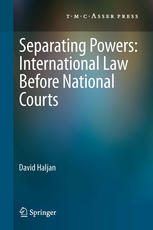

Most ebook files are in PDF format, so you can easily read them using various software such as Foxit Reader or directly on the Google Chrome browser.
Some ebook files are released by publishers in other formats such as .awz, .mobi, .epub, .fb2, etc. You may need to install specific software to read these formats on mobile/PC, such as Calibre.
Please read the tutorial at this link: https://ebookbell.com/faq
We offer FREE conversion to the popular formats you request; however, this may take some time. Therefore, right after payment, please email us, and we will try to provide the service as quickly as possible.
For some exceptional file formats or broken links (if any), please refrain from opening any disputes. Instead, email us first, and we will try to assist within a maximum of 6 hours.
EbookBell Team

4.4
102 reviewsThe more international law, taken as a global answer to global problems, intrudes into domestic legal systems, the more it takes on the role and function of domestic law. This raises a separation of powers question regarding law–making powers. This book considers that specific issue. In contrast to other studies on domestic courts applying international law, its constitutional orientation focuses on the presumptions concerning the distribution of state power. It collects and examines relevant decisions regarding treaties and customary international law from four leading legal systems, the US, the UK, France, and the Netherlands. Those decisions reveal that institutional and conceptual allegiances to constitutional structures render it difficult for courts to see their mandates and powers in terms other than exclusively national. Constitutionalism generates an inevitable dualism between international law and national law, one which cannot necessarily be overcome by express constitutional provisions accommodating international law. Valuable for academics and practitioners in the fields of international and constitutional law.